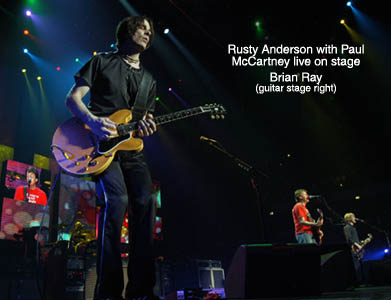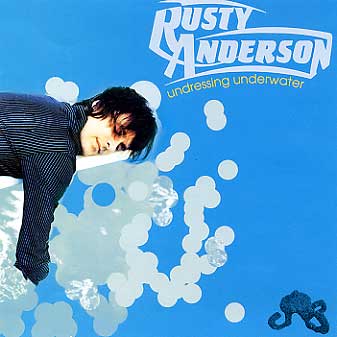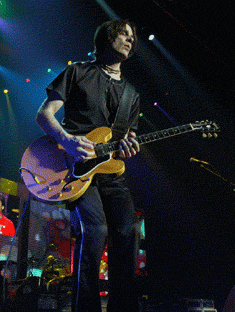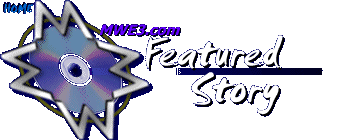
Coming Down To Earth
an interview with
Rusty
Anderson
by Robert Silverstein
If you wanna play guitar for Paul McCartney, you better be better
than good. You better be fab. Because, it’s a long, long, long
line of guitar players that Macca started with back in the late ‘50s—beginning
with John Lennon and George Harrison, moving on over to guys like
Henry McCullough, Jimmy McCullough, Laurence Juber and in the late
‘90s Jeff Lynne, Mick Green and David Gilmour. Now in September
2005 Macca’s proclivity for unveiling top guitar talent continues
with the first solo album from L.A. based Rusty Anderson, who joined
Paul’s group in 2001 for Driving Rain and continues to
fill the lead guitar slot, trading licks in Paul’s group with
guitarist / bassist Brian Ray. A modern pop savant in his own right,
Anderson comes alive on Undressing Underwater—his new
CD release on Gary Hoey’s Surfdog Records. Anderson is
the perfect candidate to carry on the spirit of Beatles style pop
and fittingly, Undressing Underwater is filled with Anderson’s
impressive composing, vocals and guitar work. All told, the second
half of 2005 promises to be a great year for McCartney fans. In addition
to Rusty Anderson’s CD, McCartney is set to bring his band back
on tour in the U.S. and is readying the release of his 2005 solo album
Chaos And Creation In The Back Yard. To top it off McCartney
group member, Brian Ray is also set to release his new solo CD. Speaking
to Robert Silverstein of mwe3000 and TCG on July 16 2005, Rusty waxed
on record about guitars, his new CD and something of what it’s
like working with one of the Fab Four.
RA: Good morning how are you?
RS: Out here in N.Y. it’s about 2:30.
RA: You’re in New York?
RS: Yeah, I’m in Queens outside the city here.
RA: Oh great.
RS: I want to congratulate you on the release of Undressing Underwater.
RA: Oh, thank you. The deal is this is my first real solo record.
What happens is you have a body of work to select from so I recorded
different things at different times. It’s all actually been recorded
within the last two or three years at different points. Maybe a track
or two was redone.
RS: How did you come up with the cool title?
RA: I sort of liked it. I thought, ‘oh, I can relate to that,’
it’s like something that seems completely useless but something
that’s very hard to do. Sometimes life feels like that, like
it’s a lot of work. And I like the water analogy because water
appears in a lot of dreams and represents like life energy and sexual
energy. And, I don’t know, it just seemed to sort of fit.
RS: In the bio some writer described the album as the ultimate guitar
album for non-guitarists! That’s a weird thing to say.
RA: I didn’t focus that much on the guitar playing actually.
I focused a lot more on the writing, the lyrics and the melodies.
That kind of thing. And most guitar player records, that’s the
last thing they think about. So maybe that’s what that was referring
to.
RS: Your guitar playing on the album really rocks.
RA: Oh, thank you.
RS: It’s really good. Who did you make the album with? First
I heard you played everything.
RA: Well, I don’t play drums very well. (laughter)
RS: You don’t...? okay.
RA: I can play drums a little but I would never try and take on that
task for real recording. I play most of the instruments but then I
had some cool people, like Paul McCartney plays bass and sings some
background vocals on “Hurt Myself”. And Stewart Copeland
plays drums on “Catbox Beach”.
RS: “Hurt Myself” features Paul’s entire current live
band.
RA: Exactly, Abe plays drums. It was really a fun process to do that.
It was sort of last minute because I asked Paul if he wanted to play
on a track and he said ‘Yeah,’ and I thought, ‘oh shit,
I gotta like collect everybody together’, so David Kahne said,
‘yeah, yeah, I’ll produce it,’ and everybody said,
‘yeah, I’ll play on it.’ So I got the studio and recorded
it. Maybe two or three days later we were off to Mexico City.
RS: So “Hurt Myself” was recorded in 2003?
RA: Yes.
RS: How did Surfdog get involved? That’s Gary Hoey’s label.
He’s pretty hot guitar player too.
RA: Actually a friend of mine in the biz sort of hooked me up with
Surfdog and it just sort of happened. It was just a good mutual click.
Back to your question about the record, I produced a lot of it myself.
David Kahne produced “Hurt Myself” and a friend of mine,
Parthenon Huxley co-produced a few songs and another guy, Mudrock,
who’s another friend of mine, co-produced a song. And I did the
rest myself. But it was an interesting process. I got to wear a lot
of hats, and all the things that go along with completion. That’s
a hard job y’know? It takes a while, yeah.
RS: I guess there’s no escaping the Beatles connection, it’s
something to be proud of.
RA: Oh sure. I’m tickled to be playing with Paul, believe me.
That’s awesome. I mean it’s just all good to me. I’m
happy to be able to make music and do that for a living. And create.
The whole thing. I love it all. I love writing and singing, playing
guitar and producing. And playing with Paul. I’ve done a lot
of playing on people’s records, and that’s fine. It’s
a good way to make a living for sure.
RS: On Paul’s Driving Rain album you play so many different
guitars. Which guitars are on Undressing Underwater?
RA: I play the 335 a lot. It seems to kind of be my main expression
instrument. I mean, I’ve gone through a lot of guitars. I went
through a Strat phrase, and SG’s. I like ‘em all. A good
guitar is a good guitar especially if it’s a classically time
proven instrument. I like old guitars a lot. I don’t know...
They just have a sweeter high end and stuff like that but I have some
new guitars that I like a lot. But the 335...I have a blond ‘59
that I’ve been playing with Paul a lot. It’s sort of overall,
my main ax.
RS: Do you ever mix the the 335 with the Les Paul on record?
RA: I can’t remember. (laughter) I think the main two categories
of six string electrics are single coil and humbuckings. And I’ve
had a tendency to gravitate more towards humbucking guitars in the
last two years. I have a Silvertone, a Silvertone sounds really great.
It’s nice ‘cause it’s sort of a cross between a Tele
and a Gibson. I find that for most things, I kind of get off on the
humbucking thing. I mean, P-90’s are nice too. I’m sort
of rediscovering those a little bit but I would get annoyed by hum
but sometimes you don’t even want to think about it.
RS: How about the Chet Atkins guitar?
RA: The nylon? The Gibson Chet Atkins is a thin body nylon. When we’re
touring I played that. On “She’s Leaving Home” there’s
a harp part that is predominant in the song. Transcribed it for two
nylons and played the right hand bit and Brian played the left hand
bit. ‘Cause there’s a piano. So that was a lot of fun. The
Chet Atkins is great for live because it really translates well to
a live room. The nylon string, you know? I have a Country Gentlemen.
I have a few Gretsch’s that I like too. They’re used live
and in the studio. You know, whatever works, really.
RS: How about that Gretsch Corvette guitar you have?
RA: That I used on a few tours. I believe it’s a fake, what are
those things called...6120’s? I bought it with one pickup in
it, no...originally it had one pickup in it and then somebody put
the treble pickup in it. And then I took it a little farther and put
another knob in. But I had it all done well and it’s a ‘50s
guitar. It sounds great. It’s got the Armonds in it and...it’s
pretty awesome.
RS: What kind of amps do you use in the studio?
RA: Well, I use Divided By Thirteen amps a lot. I use them exclusively
live. And in the studio I use those and I also use old Gibson amps,
Laney’s, old Laney’s...stuff like that.
RS: Paul’s a great guitar player too. Do you guys play the jam
on the “End” from Abbey Road.
RA: Oh, yeah. We always do that. We’ve been doing anyway, the
three way lead thing. That’s a gas. That’s a lot of fun.
RS: I could never tell who was playing what!
RA: I think that you can kinda tell. Lennon definitely had that real
super distorted, super fuzzy, two note thing. And Paul’s leads
are very sort of...they’ve got this real stylized sort of blues
thing and then Harrison sounds pretty much like Clapton. So you can
kinda tell.
RS: What’s it like playing with McCartney? When I heard the first
McCartney solo album, I never knew one musician could do all
of that.
RA: Right. Well, that’s the thing. Paul is so musical that God
sort of drew about nine thousand people’s talents into him. He’s
just so good at so many things and I think he approaches the guitar
kind of differently. He’s a lefty for one thing. He whistles
a lot and when he talks it’s a very melodic way of speaking.
His melody and phrasing and stuff is always built into everything
he does. So when he plays guitar it’s coming from an almost non-guitarist
kind of place, where he’s just thinking about the effect, the
melody, the arrangement...the end result, as opposed to the technique.
RS: There’s some great Beatles inspired moments on Undressing
Underwater. The song “Electric Trains” is one of my
favorites. I can’t remember if it was that one or “Coming
Down To Earth” that had the backwards guitar solo.
RA: “Coming Down To Earth” has the backwards guitar solo.
That’s different.
RS: Is there a story on “Electric Trains”? It’s a real
memorable kind of song.
RA: Behind the song itself? Well, the song, actually I wrote it a
while ago and then, while rewriting it, was thinking, ‘I gotta
figure out what this song’s about.’ You know? ‘Cause
I knew I had a really distinctive feeling about the song, but I couldn’t
get it in to my brain. Out of my heart, in to my brain kind of thing.
And then it hit me all of a sudden, like a kind of brick, that it
was about my brother, who passed away when I was five and he was 19.
He was the oldest and I was the youngest. And then it all sort of
clicked in to become much easier to finish, and that was that. As
far as the music for it goes, for some reason on that song, I always
had sort of a clear vision of the kind of colors that I wanted to
put in to it. ‘Cause it’s sort of about childhood and just
ethereal feelings and maybe emotions that can’t always be put
into words and I’d rather put them into melodies and sonics.
RS: First the song made me think about electric trains in a foreign
country and then I was thinking about the Lionel trains I had when
I was a kid.
RA: Yeah Neil Young is a big fan...I think he owns Lionel trains or
something now.
RS: Also “Damaged Goods” is another cool song.
RA: Yeah, that’s one I actually co-wrote with my friend Paul
Plagens, who I was in a band with for a brief amount of time. I started
off writing that on vibes and sort of came up with the chorus bit.
I just wanted it to be a real sort of ethereal, moody, melodic, dreamy
kind of song. Sort of melancholy.
RS: “Ol’ Sparky” is another cool song. What’s
that line about kissing your ass?
RA: Yeah, kiss your own ass if no one else will. I wrote that line
when I was touring with Edna Swap. And that band broke up at the end
of the ‘90s.
RS: I remember that group. That was on Island. That was cool. I think
I reviewed the CD.
RA: Yeah. Oh, yeah? It was a fun band. It was a lot of type A personalities
so I think the band sort of self-destructed or evaporated or something
at a certain point. But while we were traveling around in a little
van, around the country, touring, opening up for different acts and
playing gigs at little clubs and huge arenas and stuff, there was
a lot of tension in the band, people arguing and stuff. And there
was a point at which I think that line (laughter) sort of applied
to that situation. When you don’t have your comfort zone around
you, you have to kind of remember to love yourself (laughter) I guess.
RS: Type A, are you a fire sign or something?
RA: Well, no...I don’t know what I am. I guess I just meant that
everybody had ideas and and everybody wanted to lead instead of follow.
That makes it tough within a band. I think a lot of bands like that,
sometimes they’re great bands, but they don’t last.
Click
here to read more


